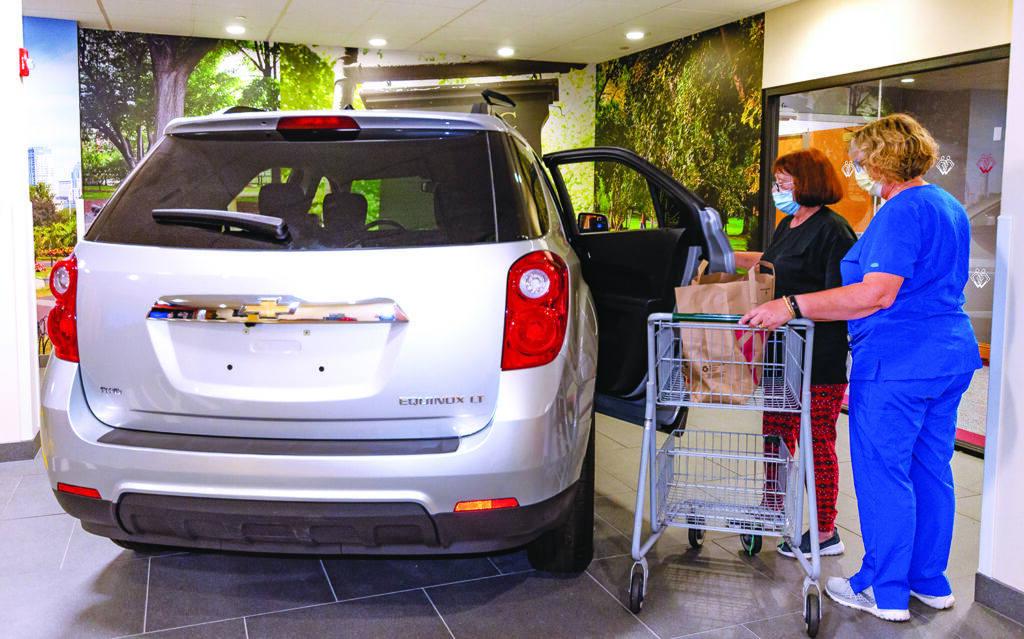Whittier Health Network
Occupational Therapy
Whittier’s patients benefit from working with a top-rated treatment team at any of our facilities. Occupational therapists prepare people to return home by practicing everyday tasks beforehand while gaining the strength, coordination, and endurance to succeed.
Occupational therapy (OT) is a specialty within the rehabilitation profession. Whittier’s occupational therapists treat clients along the full spectrum of care settings: inpatient, outpatient, and home health care, so our patients may regain their prior level of function in self-care, fine motor skills, work, and leisure pursuits and get back to performing activities of daily living (ADLs). Therapy goals are developed in coordination with other therapists on the Whittier rehab team and with the client and family members.
What makes OT different from PT?
While physical therapy (PT) treats people who have trouble getting from one place to another, OT focuses on how a patient functions once they arrive. For example, the focus of PT is for the patient to safely get to and from the shower, while the OT’s objective is for safely undressing, washing, drying off, and dressing.
Whittier’s patients benefit from working with a top-rated treatment team at any of our facilities. Occupational therapists prepare people to return home by practicing everyday tasks beforehand while gaining the strength, coordination, and endurance to succeed.
Person-centered occupational therapy
Just as Whittier’s clinical medical staff provides individualized care for recovering patients, occupational therapists provide individualized treatment plans. Clients and therapists work to develop strategies and methods to enable them to regain their ability to perform self-care tasks. Clients work toward achieving important goals, such as pursuing hobbies or returning to work.
Occupational therapy skills help you live your best life
Occupational therapists are rigorously trained and undergo a demanding certification process. Whittier’s occupational therapists employ the principles of evidence-based practice and engage in ongoing professional educational activities to maximize patient outcomes.
Occupational therapy primarily focuses on improving the function of the upper extremities, with activities promoting range of motion, strengthening, and coordination. Treatment is prescribed after evaluation and assessment of functional limitations due to any number of conditions, including stroke recovery, post-surgical recovery, cognitive decline, sensory deficits, and generalized weakness and debility.
Many patients need help to regain personal care tasks, including washing, dressing, using the bathroom, showering, and eating; home management tasks like cooking and laundry are another area of focus. Occupational therapy looks at and works on the big picture of meaningful activities for the best-individualized outcomes.
The Whittier Way
 Whittier’s two acute rehabilitation hospitals in Bradford and Westborough each have a unique setting for our patients to practice these personal care tasks. “Whittier Way” is a realistic community re-entry area that allows patients to practice everyday skills such as getting in and out of a car. This unique indoor rehabilitation concept offers a real-world environment to patients in a safe, convenient way.
Whittier’s two acute rehabilitation hospitals in Bradford and Westborough each have a unique setting for our patients to practice these personal care tasks. “Whittier Way” is a realistic community re-entry area that allows patients to practice everyday skills such as getting in and out of a car. This unique indoor rehabilitation concept offers a real-world environment to patients in a safe, convenient way.
Whittier Way offers:
- Full-size automobile, curbs, and ramps help patients to regain skills in driving and mobility
- Grocery store with realistic aisles and carts
- Simulated golf green
- Functioning movie theater
- Activities of daily living (ADL) apartment
The activities of daily living (ADL) apartment is one of the most important features, allowing Whittier patients to practice cooking, washing dishes, laundry, and bed-making; all of which are needed for a successful return to daily living.
Whittier is proud to offer Whittier Way to assist our rehabilitation teams in helping patients progress toward their goals and restoring as fully as possible the skills, confidence, and independence our patients need to return to a quality, satisfying life.
Beyond activities of daily living
Improving day-to-day function requires more than just the repetition of activities: additional support modalities help clients achieve their goals more quickly, with fewer setbacks. The OT’s experience and resources are vital to promoting continued success for the patient even after they return home.
Occupational therapists have undergone extensive training, including fabricating supportive devices like splints and slings, and they assess the client’s individual needs to make recommendations for adaptive equipment:
- Specially designed dishes, cups, and utensils promote independence at mealtimes
- Dressing aids assist with putting on socks and shoes
- Specialty devices encourage and enable independent bathing and use of the toilet
- Items to promote general safety such as railings, grab bars, or seating for the bath or shower
- Individualized exercise programs to maximize strength, coordination, and function while utilizing energy conservation and work simplification concepts
At Whittier, we believe in the potential of every patient, every family, every day
We recognize that each patient is different, comes from diverse backgrounds and experiences, and has varying abilities, health needs, goals, and dreams. Whittier’s Occupational Therapy departments, throughout our many facilities, work to maintain a continuity of care from admission through discharge home, where we will continue to provide therapy for the patients who need it most. Whittier’s patients experience greater satisfaction with our quality care and superior clinical outcomes!

